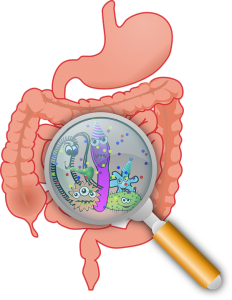 Have you ever been told to eat your veggies? Many of us have been told as children that vegetables and other plant-based foods would help us grow strong. And as adults, you may have been told that eating more vegetables will help you manage your weight. But recent studies show that plant-based foods may also be good for your gut health, especially for those with Crohn’s disease.
Have you ever been told to eat your veggies? Many of us have been told as children that vegetables and other plant-based foods would help us grow strong. And as adults, you may have been told that eating more vegetables will help you manage your weight. But recent studies show that plant-based foods may also be good for your gut health, especially for those with Crohn’s disease.
What is Crohn’s disease?
Crohn’s disease is a type of inflammatory bowel disease (IBD) that can greatly impact quality of life. Those with the condition have symptoms like abdominal pain, severe diarrhea, weight loss, malnutrition, and fatigue. Also, people with severe forms of the disease can also have inflammation in their skin, eyes, joints, and liver too.
If you think you may have Crohn’s disease, there are certain tests that can help diagnose it. Such tests include a colonoscopy, a CT scan, an MRI scan, or certain blood tests like a fecal occult blood test. Once diagnosed, you can treat this condition with anti-inflammatory medicines, immune system suppressors, or antibiotics. Other medicines people may use to relieve symptoms of Crohn’s include:
- anti-diarrheals
- pain relievers
- iron supplements
- vitamin B-12 shots
- calcium and vitamin D supplements
People with Crohn’s disease may need some vitamin supplements since the disease can sometimes cause deficiencies. For example, the disease can cause B-12 deficiency in some or may cause anemia due to blood loss from blood in the stool. Also, those with the disease may be at higher risk for the bone weakening condition osteoporosis which can make calcium and vitamin D supplements necessary to help strengthen bones.
Why is a plant-based diet good for you?
A diet rich in plant-based foods are healthy for you for many reasons. Plant-based foods like fruits, vegetables, nuts, and seeds contain not only fiber, but also antioxidants. Antioxidants help reduce inflammation in the body, and therefore can help reduce risk of inflammatory diseases like heart disease, diabetes, and digestive conditions like IBD.
In fact, research shows that a plant-based diet can improve weight, blood glucose levels, as well as mental health. In turn, such a diet can help increase quality of life of those with diabetes. Therefore, adding in at least 1.5 cups of fruit and 2 cups of vegetables a day into your daily regimen can help enhance your health for many years to come in many ways.
Plant-based diet and Crohn’s disease research
A recent case study shows promise that a plant-based diet may help those with Crohn’s reduce symptoms. One man with Crohn’s disease started a plant-based diet with no animal-based products or highly processed foods after treatment for his disease was not fully working. Although he received IV infusions of medication every two months for a year to help his symptoms, he still had not achieved remission of his symptoms. He still suffered with abdominal pain, bloating, and fatigue.
So, during his second year of using medication, he started a plant-based diet. After six months of sticking to this diet and exercising, a colonoscopy revealed “complete mucosal healing with no visible evidence of Crohn’s disease.” Now researchers are not sure if this type of diet would help everyone with the condition, but it does provide experts with the drive to do more research into this type of diet for those with the condition.
Other ways you can improve gut health
Besides eating a plant-based diet, there are other ways you can help your gut health including the following:
- Eat more fermented foods: Foods like yogurt, sauerkraut, kimchi, or drinking kombucha contain healthy bacteria. Therefore, they can provide the body with good bacteria that can help increase diversity in the gut, and in turn reduce inflammation.
- Take a probiotic supplement daily. A probiotic supplement is another way to get more healthy bacteria into your gut. Be sure to take one daily that contains a diverse array of strains and at least 1 billion colony-forming units (CFUs) like Biovia30 by Vita Sciences. Biovia30 contains 10 probiotic strains with a total of 30 billion CFUs per serving to help promote digestive health.
- Manage stress: Whether you use yoga, meditation, or talk therapy to help you manage stress, be sure to do something to help you stay calm. This is because stressors, even those like a lack of sleep, can disrupt the bacteria in the gut.
- Exercise often: Research shows that those who exercise most days of the week have a greater diversity of gut bacteria than those who don’t. So, try to be active as often as you can to help your gut health.
-written by Staci Gulbin, MS, MEd, RD, LDN
References:
Centers for Disease Control (November 16, 2017) “Only 1 in 10 Adults Get Enough Fruits or Vegetables.”
Leonard, J. (May 28, 2019) “10 ways to improve gut health.” Medical News Today.
Mayo Clinic (June 26, 2019) “Crohn’s disease.”
Paddock, Ph.D., C. (June 27, 2019) “Could a plant-based diet be the answer to Crohn’s disease?” Medical News Today.
Toumpanakis, A., Turnbull, T., and Alba-Barba, I. (October 2018) “Effectiveness of plant-based diets in promoting well-being in the management of type 2 diabetes: a systematic review.” BMJ Open Diabetes Res Care., 6(1):e000534.
 Unless you have kidney disease, you may not realize how important these small organs are to overall health. Although they are only about the size of a fist each, these bean-shaped organs do a lot for your body. Their main function is to filter the blood. However, they also work to remove wastes from the body as well as remove extra water to produce urine. The kidneys also make hormones to help with bone health and blood pressure health.
Unless you have kidney disease, you may not realize how important these small organs are to overall health. Although they are only about the size of a fist each, these bean-shaped organs do a lot for your body. Their main function is to filter the blood. However, they also work to remove wastes from the body as well as remove extra water to produce urine. The kidneys also make hormones to help with bone health and blood pressure health. Anyone who has been on a healthy lifestyle plan knows that you should try not to drink your calories. This is because you want to cut calories wherever you can to lose weight. However, cutting out those sugary drinks are not only helpful in weight loss, but also in cutting your disease risk. In fact, a recent study found that those who drank less sugary drinks had a lower risk of chronic diseases and early death as compared to those who drank sugary drinks often.
Anyone who has been on a healthy lifestyle plan knows that you should try not to drink your calories. This is because you want to cut calories wherever you can to lose weight. However, cutting out those sugary drinks are not only helpful in weight loss, but also in cutting your disease risk. In fact, a recent study found that those who drank less sugary drinks had a lower risk of chronic diseases and early death as compared to those who drank sugary drinks often. If you’ve ever tried to eat healthy, which I’m sure most of us have, then you may have been told to eat more vegetables. This is a tried and true statement that is vital to every healthy lifestyle. This is because plant-based foods like fruits and vegetables are full of gut-healthy fiber and antioxidants. In turn, this helps to lower your risk of chronic diseases like heart disease and diabetes. That is why it may not be surprising that a recent study shows that a plant-based diet may help diabetes treatment.
If you’ve ever tried to eat healthy, which I’m sure most of us have, then you may have been told to eat more vegetables. This is a tried and true statement that is vital to every healthy lifestyle. This is because plant-based foods like fruits and vegetables are full of gut-healthy fiber and antioxidants. In turn, this helps to lower your risk of chronic diseases like heart disease and diabetes. That is why it may not be surprising that a recent study shows that a plant-based diet may help diabetes treatment. Although some fats are healthy in a balanced diet, too much of anything can be a harmful thing. For some people, like those with irritable bowel syndrome, too much fat in the diet may cause digestive distress. And for those with conditions like pancreatitis, fat is not digested well, so must be limited in the diet. Recent research shows that anyone, no matter their health status, may be at risk for gut health issues on a high fat diet.
Although some fats are healthy in a balanced diet, too much of anything can be a harmful thing. For some people, like those with irritable bowel syndrome, too much fat in the diet may cause digestive distress. And for those with conditions like pancreatitis, fat is not digested well, so must be limited in the diet. Recent research shows that anyone, no matter their health status, may be at risk for gut health issues on a high fat diet. When you think of celebrating the holidays, sweet treats, comfort foods, and holiday-flavored spirits may come to mind. Although it’s definitely ok to indulge a little during the holidays, too much of anything can sabotage your healthy lifestyle efforts. And with the new year rolling around soon, you should think ahead and make a plan. Because once this holiday season is over, the new year will surely bring about new celebrations with more food and drink temptations. And recent research shows that by drinking less alcohol, you could increase your chances for weight loss success.
When you think of celebrating the holidays, sweet treats, comfort foods, and holiday-flavored spirits may come to mind. Although it’s definitely ok to indulge a little during the holidays, too much of anything can sabotage your healthy lifestyle efforts. And with the new year rolling around soon, you should think ahead and make a plan. Because once this holiday season is over, the new year will surely bring about new celebrations with more food and drink temptations. And recent research shows that by drinking less alcohol, you could increase your chances for weight loss success. Vegan diets have seemed to gain popularity over the years for several reasons. First of all, a plant-based diet full of fiber and antioxidants seems to improve heart health risk factors. Secondly, it’s a way for people to show they support animal rights. Also, it’s an eating regimen that can be fitting for those who may have dairy and or egg allergies. However, recent research shows that a vegan diet could also help improve the health of body and mind of those with type 2 diabetes.
Vegan diets have seemed to gain popularity over the years for several reasons. First of all, a plant-based diet full of fiber and antioxidants seems to improve heart health risk factors. Secondly, it’s a way for people to show they support animal rights. Also, it’s an eating regimen that can be fitting for those who may have dairy and or egg allergies. However, recent research shows that a vegan diet could also help improve the health of body and mind of those with type 2 diabetes.  Depression on its own can be a very challenging condition to deal with. This diagnosis not only affects the mind, but can affect the body as well. It can make everyday tasks difficult to deal with such as sleeping, working, and even eating. Because of the effect of depression on eating behaviors, weight gain or loss can occur through appetite changes unrelated to diet. Not only that, but because of the many lifestyle changes that come with a diabetes diagnosis,
Depression on its own can be a very challenging condition to deal with. This diagnosis not only affects the mind, but can affect the body as well. It can make everyday tasks difficult to deal with such as sleeping, working, and even eating. Because of the effect of depression on eating behaviors, weight gain or loss can occur through appetite changes unrelated to diet. Not only that, but because of the many lifestyle changes that come with a diabetes diagnosis,  An essential part of a heart healthy diet is plenty of plant-based unsaturated fats. Not only do plant-based foods provide heart-healthy fiber, but they are also rich in antioxidants. These antioxidants can help reduce inflammation in the body, and in turn reduce chronic disease risk. One such group of antioxidants are the omega-3 fatty acids found in such foods as avocado, plant-based oils and fatty fish. Recent research shows that these healthy fats may be able to help with mental health. A recent study shows that by increasing the amount of healthy fats in your diet, you could help reduce symptoms of anxiety.
An essential part of a heart healthy diet is plenty of plant-based unsaturated fats. Not only do plant-based foods provide heart-healthy fiber, but they are also rich in antioxidants. These antioxidants can help reduce inflammation in the body, and in turn reduce chronic disease risk. One such group of antioxidants are the omega-3 fatty acids found in such foods as avocado, plant-based oils and fatty fish. Recent research shows that these healthy fats may be able to help with mental health. A recent study shows that by increasing the amount of healthy fats in your diet, you could help reduce symptoms of anxiety. Probiotics are getting more press each and every day for their health benefits. From skin health, improving bone health, and of course, enhancing gut health, the possibilities seem endless. In fact, a recent study shows that combining a probiotic with breastfeeding in the first year of life can have improvements in the gut health of infants.
Probiotics are getting more press each and every day for their health benefits. From skin health, improving bone health, and of course, enhancing gut health, the possibilities seem endless. In fact, a recent study shows that combining a probiotic with breastfeeding in the first year of life can have improvements in the gut health of infants.